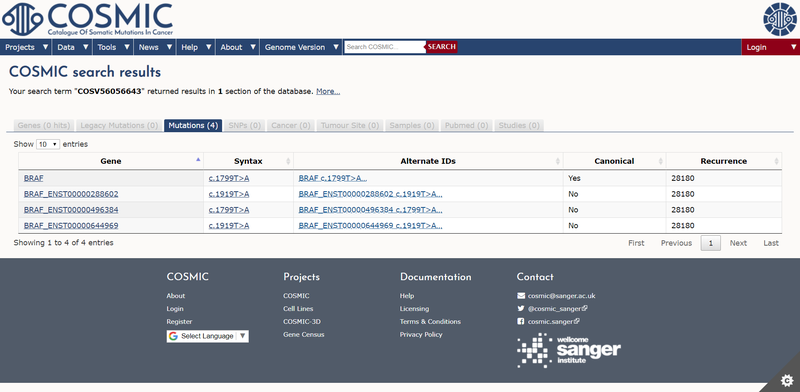Searchable COSMIC Identifiers
21 Nov 2019
We are pleased to announce that genomic mutation identifiers (COSV) are now searchable on the website, alongside the legacy identifiers (COSM and COSN). This should significantly help the transition to the new identifiers, while increasing their visibility and utility.
With this update, typing either COSM476 or COSV56056643 into the search box on the COSMIC website will take you to the corresponding BRAF mutation. Searching using the COSM will take you directly to the variant on the canonical transcript, unless there is no canonical transcript, in which case the search will take you to a landing page where you can choose to view the variant on alternate transcripts. Searching via the COSV will always take you to a landing page where you can choose to view the variant on the canonical transcript, if it exists, or an alternate transcript otherwise. You can see an example of this in the image below:

A reminder of the different identifiers:
Genomic Mutation Identifier
The genomic mutation identifier (COSV) indicates the definitive position of the variant on the genome. This identifier is trackable and stable between different versions of the release and remains the same between different assemblies (GRCh37 and GRCh38). The genomic mutation identifier is now the preferred way to identify mutations. Note that mutations with no known genomic coordinates will not have a value for this identifier, and may be identified using the legacy mutation identifier. The genomic mutation identifier is referred to as GENOMIC_MUTATION_ID in the download files.
Legacy Mutation Identifier
The existing COSM and COSN mutation identifiers are now referred to as legacy mutation identifiers, retaining their COSM/COSN nomenclature. These identifiers remain the same between different assemblies (GRCh37 and GRCh38). The legacy mutation identifier is referred to as LEGACY_MUTATION_ID in the download files.
Previously, each mutation at a specific genomic coordinate but on a different transcript had a unique COSM identifier. Now, all COSM identifiers at the same genomic location have been collapsed into one representative COSM identifier. All previous COSM identifiers are being maintained in order to enable tracking of existing mutations. Mutations can be found in the website using legacy mutation identifiers, either by entering the full identifier in the search bar, e.g. COSM476, or by entering the URL directly, inserting the numerical part of the COSM, e.g. https://cancer.sanger.ac.uk/cosmic/mutation/overview?id=476.
Similarly, COSN mutations may be found by searching using the legacy mutation identifier, e.g. COSN9832680, or by inserting the numerical part of the variant's corresponding COSN into the URL, e.g. https://cancer.sanger.ac.uk/cosmic/ncv/overview?id=71991075. Please note the addition of ncv in the URL.
Alternative Mutation Identifiers
These are internal identifiers that are unique to a mutation on a particular transcript and are displayed in the URL of the mutation pages. Therefore, several of these alternative mutation IDs could be associated with a single genomic mutation identifier (COSV), in cases where the mutation has been mapped to all overlapping genes and transcripts. The alternative mutation identifier is referred to as MUTATION_ID in the download files.
Similarly, since every variant with known genomic coordinates has been assigned a genomic mutation identifier, each legacy mutation identifier (COSM) can also be associated with several alternative mutation identifiers. These internal IDs are expected to change between assemblies (GRCh37 and GRCh38), since each assembly build has its own set of genes and transcripts, and between releases.
Full details of the changes in the v90 release are available on the variant updates page.
If you have any questions or suggestions, please let us know. We have already had some great feedback and we’re aware of a few issues in the release, which we’re looking at right now. We’ll announce any updates here on the blog as they happen.
